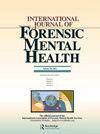Sexual and Violent Recidivism of Empirically-Typed Individuals Convicted of Rape
IF 0.9
4区 医学
Q3 CRIMINOLOGY & PENOLOGY
International Journal of Forensic Mental Health
Pub Date : 2022-04-07
DOI:10.1080/14999013.2022.2052999
引用次数: 2
Abstract
Abstract Men convicted of rape are a heterogenous group among individuals with sexual offending history. This may contribute to the difficulty of establishing adequate treatment during institutionalization and preventing recidivism after release. Therefore, we aimed to identify an empirical typology of individuals convicted of rape based on (a) common criminological variables (age at first offense, number of prior convictions, relation to the victim), (b) offense behavior (alcoholization during the offense) and (c) clinical diagnoses (substance abuse and dependence, psychopathy, sexual sadism, Cluster B personality disorders, paraphilias, paraphilia-related disorders) associated with the risk of sexual offending. Data of N = 575 adult males with raping history were analyzed. We found four types with different profiles in the described variables: an antisocial impulsive, a sexualized, a highly violent and a non-criminal situational type. The types significantly varied in prognostic validity for violent, but not sexual, recidivism. Also, the typology exhibited a slightly higher predictive validity for violent recidivism than Static-99 scores. In contrast to Static-99, the typology failed to significantly predict sexual recidivism. Although the types explained more variance of violent recidivism than Static-99 scores, the value of applying a broad set of risk factors in contrast to combining only few are discussed.经验型强奸犯的性与暴力累犯
摘要在有性侵犯史的个体中,被判犯有强奸罪的男性是一个异质性群体。这可能会导致在收容期间建立适当治疗和防止释放后再犯的困难。因此,我们的目的是根据(a)常见的犯罪学变量(初犯年龄、前科数量、与受害者的关系)、(b)犯罪行为(犯罪期间酗酒)和(c)与性犯罪风险相关的临床诊断(药物滥用和依赖、精神病、性施虐、b类人格障碍、性反常、性反常相关障碍)来确定被判强奸的个体的经验类型。对575名有强奸史的成年男性进行数据分析。我们在描述的变量中发现了四种不同类型的人:反社会冲动型、性化型、高度暴力型和非犯罪情景型。这些类型在暴力累犯的预测有效性上有显著差异,而不是性累犯。此外,该类型对暴力再犯的预测效度略高于静态-99分数。与Static-99相比,该类型不能显著预测性再犯。尽管与Static-99分数相比,这些类型解释了更多的暴力累犯的差异,但与仅结合少数风险因素相比,应用广泛的风险因素的价值得到了讨论。
本文章由计算机程序翻译,如有差异,请以英文原文为准。
求助全文
约1分钟内获得全文
求助全文

 求助内容:
求助内容: 应助结果提醒方式:
应助结果提醒方式:


